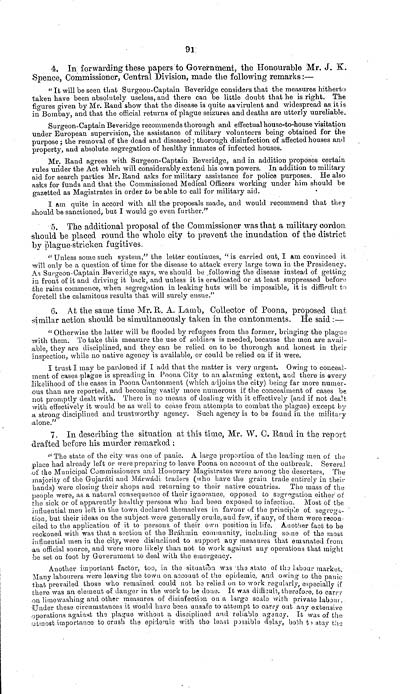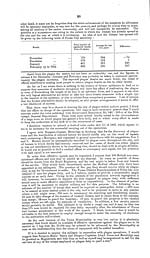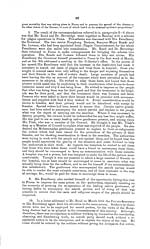Medicine - Disease > Account of plague administration in the Bombay Presidency from September 1896 till May 1897
(103) Page 91
Download files
Individual page:
Thumbnail gallery: Grid view | List view

91
4. In forwarding these papers to Government, the Honourable Mr. J. K. Spence, Commissioner, Central Division, made the following remarks:-
"It will be seen that Surgeon-Captain Beveridge considers that the measures hitherto taken have been absolutely useless, and there can be little doubt that he is right. The figures given by Mr. Rand show that the disease is quite as virulent and widespread as it is in Bombay, and that the official returns of plague seizures and deaths are utterly unreliable.
Surgeon-Captain Beveridge recommends thorough and effectual house-to-house visitation under European supervision, the assistance of military volunteers being obtained for the purpose; the removal of the dead and diseased; thorough disinfection of affected houses and property, and absolute segregation of healthy inmates of infected houses.
Mr. Rand agrees with Surgeon-Captain Beveridge, and in addition proposes certain rules under the Act which will considerably extend his own powers. In addition to military aid for search parties Mr. Rand asks for military assistance for police purposes. He also asks for funds and that the Commissioned Medical Officers working under him should be gazetted as Magistrates in order to be able to call for military aid.
I am quite in accord with all the proposals made, and would recommend that they should be sanctioned, but I would go even further."
5. The additional proposal of the Commissioner was that a military cordon should be placed round the whole city to prevent the inundation of the district by plague-stricken fugitives.
"Unless some such system," the letter continues, " is carried out, I am convinced it will only be a question of time for the disease to attack every large town in the Presidency. As Surgeon-Captain Beveridge says, we should be following the disease instead of getting in front of it and driving it back, and unless it is eradicated or at least suppressed before the rains commence, when segregation in leaking huts will be impossible, it is difficult to foretell the calamitous results that will surely ensue."
6. At the same time Mr. R. A. Lamb, Collector of Poona, proposed that similar action should be simultaneously taken in the cantonments. He said:-
"Otherwise the latter will be flooded by refugees from the former, bringing the plague with them. To take this measure the use of soldiers is needed, because the men are avail-
able, they are disciplined, and they can be relied on to be thorough and honest in their inspection, while no native agency is available, or could be relied on if it were,
I trust I may be pardoned if I add that the matter is very urgent. Owing to concealment of cases plague is spreading in Poona City to an alarming extent, and there is every likelihood of the cases in Poona Cantonment (which adjoins the city) being far more numerous than are reported, and becoming vastly more numerous if the concealment of cases be not promptly dealt with. There is no means of dealing with it effectively (and if not dealt with effectively it would be as well to cease from attempts to combat the plague) except by a strong disciplined and trustworthy agency. Such agency is to be found in the military alone."
7. In describing the situation at this time, Mr. W. C. Rand in the report drafted before his murder remarked:
"The state of the city was one of panic. A large proportion of the leading men of the place had already left or were preparing to leave Poona on account of the outbreak. Several of the Municipal Commissioners and Honorary Magistrates were among the deserters. The majority of the Gujarti and Mrwdi traders (who have the grain trade entirely in their hands) were closing their shops and returning to their native countries. The mass of the people were, as a natural consequence of their ignorance, opposed to segregation either of the sick or of apparently healthy persons who had been exposed to infection. Most of the influential men left in the town declared themselves in favour of the principle of segregation, but their ideas on the subject were generally crude, and few, if any, of them were recon-ciled to the application of it to persons of their own position in life. Another fact to be reckoned with was that a section of the Brhmin community, including some of the most influential men in the city, were disinclined to support any measures that emanated from an official source, and were more likely than not to work against any operations that might be set on foot by Government to deal with the emergency.
Another important factor, too, in the situation was the state of the labour market. Many labourers were leaving the town on account of the epidemic, and owing to the panic-that prevailed those who remained could not be relied on to work regularly, especially if there was an element of danger in the work to be done. It was difficult, therefore, to carry on lime washing and other measures of disinfection on a large scale with private labour. Under these circumstances it would have been unsafe to attempt to carry out any extensive operations against the plague without a disciplined and reliable agency. It was of the atmost importance to crush the epidemic with the least possible delay, both to stay the
4. In forwarding these papers to Government, the Honourable Mr. J. K. Spence, Commissioner, Central Division, made the following remarks:-
"It will be seen that Surgeon-Captain Beveridge considers that the measures hitherto taken have been absolutely useless, and there can be little doubt that he is right. The figures given by Mr. Rand show that the disease is quite as virulent and widespread as it is in Bombay, and that the official returns of plague seizures and deaths are utterly unreliable.
Surgeon-Captain Beveridge recommends thorough and effectual house-to-house visitation under European supervision, the assistance of military volunteers being obtained for the purpose; the removal of the dead and diseased; thorough disinfection of affected houses and property, and absolute segregation of healthy inmates of infected houses.
Mr. Rand agrees with Surgeon-Captain Beveridge, and in addition proposes certain rules under the Act which will considerably extend his own powers. In addition to military aid for search parties Mr. Rand asks for military assistance for police purposes. He also asks for funds and that the Commissioned Medical Officers working under him should be gazetted as Magistrates in order to be able to call for military aid.
I am quite in accord with all the proposals made, and would recommend that they should be sanctioned, but I would go even further."
5. The additional proposal of the Commissioner was that a military cordon should be placed round the whole city to prevent the inundation of the district by plague-stricken fugitives.
"Unless some such system," the letter continues, " is carried out, I am convinced it will only be a question of time for the disease to attack every large town in the Presidency. As Surgeon-Captain Beveridge says, we should be following the disease instead of getting in front of it and driving it back, and unless it is eradicated or at least suppressed before the rains commence, when segregation in leaking huts will be impossible, it is difficult to foretell the calamitous results that will surely ensue."
6. At the same time Mr. R. A. Lamb, Collector of Poona, proposed that similar action should be simultaneously taken in the cantonments. He said:-
"Otherwise the latter will be flooded by refugees from the former, bringing the plague with them. To take this measure the use of soldiers is needed, because the men are avail-
able, they are disciplined, and they can be relied on to be thorough and honest in their inspection, while no native agency is available, or could be relied on if it were,
I trust I may be pardoned if I add that the matter is very urgent. Owing to concealment of cases plague is spreading in Poona City to an alarming extent, and there is every likelihood of the cases in Poona Cantonment (which adjoins the city) being far more numerous than are reported, and becoming vastly more numerous if the concealment of cases be not promptly dealt with. There is no means of dealing with it effectively (and if not dealt with effectively it would be as well to cease from attempts to combat the plague) except by a strong disciplined and trustworthy agency. Such agency is to be found in the military alone."
7. In describing the situation at this time, Mr. W. C. Rand in the report drafted before his murder remarked:
"The state of the city was one of panic. A large proportion of the leading men of the place had already left or were preparing to leave Poona on account of the outbreak. Several of the Municipal Commissioners and Honorary Magistrates were among the deserters. The majority of the Gujarti and Mrwdi traders (who have the grain trade entirely in their hands) were closing their shops and returning to their native countries. The mass of the people were, as a natural consequence of their ignorance, opposed to segregation either of the sick or of apparently healthy persons who had been exposed to infection. Most of the influential men left in the town declared themselves in favour of the principle of segregation, but their ideas on the subject were generally crude, and few, if any, of them were recon-ciled to the application of it to persons of their own position in life. Another fact to be reckoned with was that a section of the Brhmin community, including some of the most influential men in the city, were disinclined to support any measures that emanated from an official source, and were more likely than not to work against any operations that might be set on foot by Government to deal with the emergency.
Another important factor, too, in the situation was the state of the labour market. Many labourers were leaving the town on account of the epidemic, and owing to the panic-that prevailed those who remained could not be relied on to work regularly, especially if there was an element of danger in the work to be done. It was difficult, therefore, to carry on lime washing and other measures of disinfection on a large scale with private labour. Under these circumstances it would have been unsafe to attempt to carry out any extensive operations against the plague without a disciplined and reliable agency. It was of the atmost importance to crush the epidemic with the least possible delay, both to stay the
Set display mode to: Large image | Zoom image | Transcription
Images and transcriptions on this page, including medium image downloads, may be used under the Creative Commons Attribution 4.0 International Licence unless otherwise stated. ![]()
| India Papers > Medicine - Disease > Account of plague administration in the Bombay Presidency from September 1896 till May 1897 > (103) Page 91 |
|---|
| Permanent URL | https://digital.nls.uk/74517216 |
|---|




